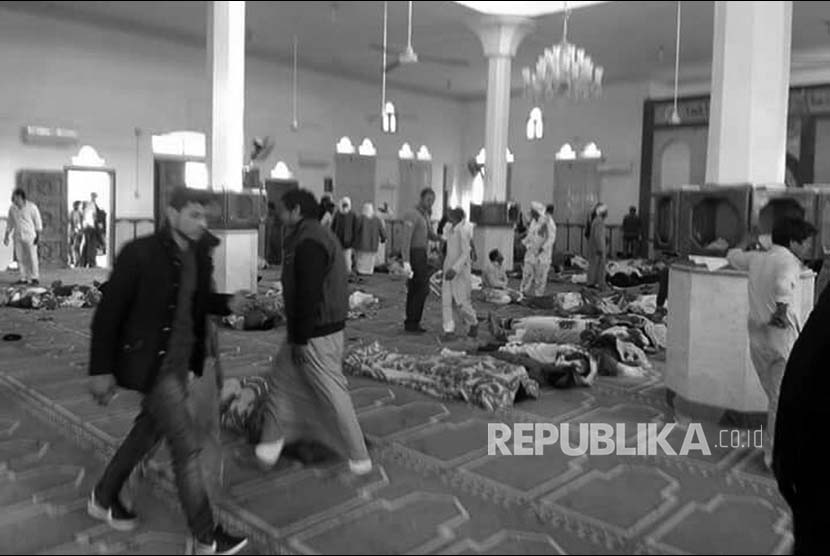REPUBLIKA.CO.ID, ISMAILIA -- "The whole thing started with a grenade thrown from the window, then masked militants rushed into the mosque, showering us with bullets, leaving dead bodies scattered everywhere," Mohamed Ali described the Friday attack on a mosque that killed 305 people in Egypt's North Sinai.
It was a real inferno, said the 33-year-old man, who was shot with two bullets in the legs. He is now receiving medical treatment in Ismailia province by the Suez Canal, southwest of terror-stricken North Sinai.
Ali, a father of four who works as salesman at a grocery in al-Rawda village, where the attack took place, told Xinhua that he still could not believe that he survived this "heinous massacre."
The militants attacked the mosque minutes after the preacher started his sermon, he said with a low fatigued voice as he struggled his pains.
No group has claimed responsibility for the attack so far.
However, fingers are pointed at a Sinai-based group loyal to the Islamic State of Iraq and the Levant (ISIL/ISIS) regional terrorist group, which has claimed most of the large terrorist operations in Egypt over the past few years and whose affiliates are currently facing massive security crackdown in Syria and Iraq.
It is the first time a mosque is targeted by militants in Egypt. Previously, dozens of Christians have been killed in similar attacks on churches across Egypt.
North Sinai province, a mostly desert area bordering Israel and the Palestinian Gaza Strip, has been experiencing waves of anti-security attacks that killed hundreds of police and army men since the army-led ouster of Islamist president Mohamed Morsi in 2013 in response to mass protests against his rule.
"The terrorists threw bombs from the windows and doors of the mosque, besieging us inside and started to shoot randomly," he recalled. "Bodies of the dead and panicked injured worshippers lied motionless with blood splattered across the Mosque."
Ali said he was praying on the front-line chairs near the preacher's rostrum, which he used as a cover from the terrorists' showers of gunshots.
"The pulpit did not protect me as I was injured with two bullets, but at least it saved my life," Ali said, looking at the central venous line placed into his arm.
When some worshippers attempted to get out of the mosque, He went on saying, some masked men finished them with rounds from their machine guns.
"It was horrible and chaotic...they showed no mercy, it was an act of genocide," he said as tears rolled down his pale cheeks. "Three brothers from my neighborhood were killed in cold blood."
Meanwhile, the Egyptian military spokesman said air forces jets hit a number of vehicles loaded with terrorists involved in the deadly attack.
In addition, the air forces targeted a number of hideouts containing weapons and ammunition that belong to the extremists, the spokesman added.
The airstrikes came hours after Egyptian President Abdel-Fattah al-Sisi vowed to respond fiercely against terrorists who carried out the attack.
"The army and police will avenge our martyrs and return security and stability with force in the coming short period," he said in a televised speech.
Outside the Suez Canal University's Hospital in Ismailia, long queues of the victims' relatives laid on the ground, some covered with blankets.
"My 23-years old nephew, Amir, who was working as a nurse was murdered in the attack," said Samy Mohammed, who came from Delta Menoufia province to Ismailia after he was told about the death of his nephew.
The father of Amir, Magdy, a 45-year-old teacher has also been wounded in the attack by three bullets, two in his legs and one in his right arm, Mohammed told Xinhua while waiting outside the hospital.
"I couldn't get the body of Amir. He was buried in collective graves in Sinai... we sadly could not bid him a farewell ceremony," he said while weeping.


